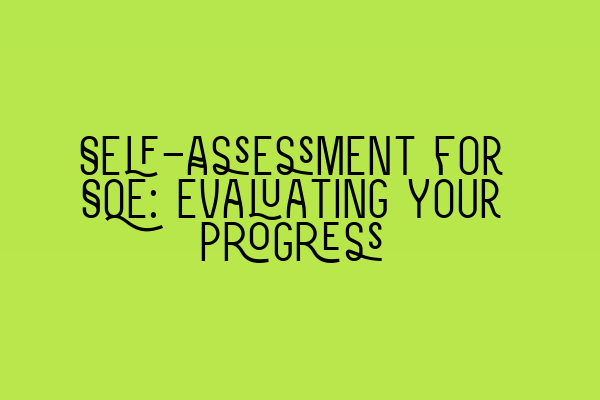Self-Assessment for SQE: Evaluating Your Progress
Preparing for the Solicitors Qualifying Examination (SQE) is no small feat, and it’s crucial to continually evaluate your progress along the way. Self-assessment plays a vital role in identifying your strengths and weaknesses, allowing you to make targeted improvements and increase your chances of success. In this blog post, we will explore the importance of self-assessment for SQE preparation and provide tips on how to evaluate your progress effectively.
Why Self-Assessment Matters
Self-assessment is the key to understanding your current level of knowledge and skills. It helps you gauge your readiness for the SQE and guides you towards areas that require more focus and attention. By regularly assessing yourself, you can actively track your improvement and identify any gaps in your understanding.
While external feedback is valuable, self-assessment allows you to take ownership of your progress. It enables you to take a closer look at your performance, reflecting on what worked well and what needs improvement. This information is invaluable in tailoring your study approach and ensuring you are on the right track to achieving success in the SQE.
Evaluating Your Progress: Key Steps
1. Set Clear Goals: Start by setting specific and realistic goals for each stage of your preparation. These goals will help you evaluate your progress effectively. For example, you might aim to complete a certain number of practice tests or master specific legal principles within a given timeframe.
2. Determine Evaluation Metrics: Establish clear metrics to measure your progress. This could include tracking your scores on practice exams, monitoring your understanding of key legal concepts, or evaluating your performance in mock assessments. By defining these metrics, you can easily identify areas where you need improvement and measure your growth throughout the preparation process.
3. Regularly Take Mock Exams: Mock exams are one of the most effective ways to assess your progress and simulate the real exam environment. They allow you to identify your strengths and weaknesses, analyze your performance, and adjust your study strategy accordingly. Make use of SQE mock debrief sessions to gain valuable insights and learn from experienced professionals.
4. Analyze Your Results: After each assessment, take the time to analyze your results. Identify patterns, understand where you went wrong, and determine which areas require improvement. Look for recurring mistakes or areas of inconsistency and use them as a roadmap for future study sessions.
5. Seek External Feedback: While self-assessment is crucial, external feedback can provide additional insights and perspectives. Engage with mentors, tutors, or study groups to gain different viewpoints on your performance. Their expertise can help you identify blind spots and provide guidance on areas that need further attention.
6. Utilize Top Resources: Take advantage of top resources for SQE preparation to enhance your self-assessment process. Various tools and study materials can assist in evaluating your progress, such as comprehensive study guides, online practice questions, and model answers.
The Importance of Self-Reflection
In addition to evaluating your progress, self-reflection is equally important. Set aside time to reflect on your study habits, time management skills, and overall preparation strategy. Ask yourself the following questions:
– Am I utilizing my study time effectively?
– Are there any distractions I need to eliminate?
– Do I need to adjust my study schedule to accommodate my strengths and weaknesses?
– Have I been consistent in my approach to practice exams and mock assessments?
Answering these questions honestly will help you make necessary adjustments and improvements in your study routine. Regular self-reflection will ensure that you stay motivated, focused, and on the path to success in the SQE.
Final Thoughts
Evaluating your progress through self-assessment is an essential component of SQE preparation. It provides valuable insights into your strengths, weaknesses, and areas for improvement. By setting clear goals, utilizing metrics, regularly taking mock exams, and seeking external feedback, you can continually refine your study approach and maximize your chances of success.
Remember that self-assessment is an ongoing process. Regularly evaluate your progress, adjust your study strategy as needed, and stay determined in your pursuit of SQE success. For more insights on SQE preparation, check out our related articles:
- SQE Mock Debrief Sessions: Analyzing Your Performance for Growth
- Top Resources for SQE Preparation: Tools to Help You Succeed
- The Importance of Mocks in SQE Preparation: A Game Changer
- Unveiling the Solicitors Qualifying Examination (SQE): What You Need to Know
- Tips for SQE Success: Key Pointers for a Stellar Performance

Leave a Reply